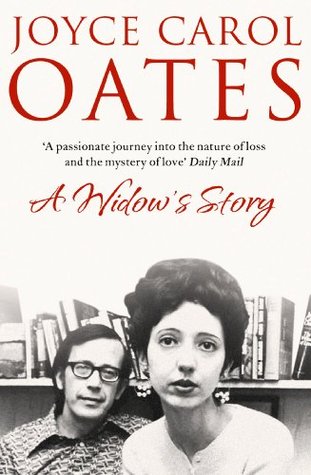
A WIDOW’S STORY: A MEMOIR BY JOYCE CAROL OATES
FOURTH EASTATE (KINDLE), 2011
437 PAGES
I read a non-fiction choice every month. This is my choice for April.
WHAT IT’S ABOUT
“My husband died, my life collapsed.”
On a February morning, Joyce Carol Oates drove her ailing husband, Raymond Smith, to the Princeton Medical Centre where he was diagnosed with pneumonia. In less than a week, Ray was dead and Joyce was faced – totally unprepared – with the reality of widowhood.
In this beautiful and heart-breaking account, Joyce takes us through what it is to become a widow: the derangement of denial, the anguish of loss, the disorientation of the survivor and the solace of friendship. Acutely perceptive and intensely moving, A Widow’s Story is at once a truly personal account and an extraordinary and universal story of life and death, love and grief.
OPENING
February 15, 2008. Returning to our car that has been haphazardly parked – by me – on a narrow side street near the Princeton Medical Centre – I see, thrust beneath a windshield wiper, what appears to be a sheet of stiff paper. At once my heart clenches in dismay, guilty apprehension – a ticket? A parking ticket? At such a time? Earlier that afternoon I’d parked here on my way – hurried, harried – a jangle of admonitions running through my head like shrieking cicadas – if you’d happened to see me you might have thought pityingly That woman is in a desperate hurry – as if that will do any good – to visit my husband in the Telemetry Unit of the medical centre where he’d been admitted several days previously for pneumonia; now I need to return home for a few hours preparatory to returning to the medical centre in the early evening – anxious; dry-mouthed and head-aching yet in an aroused state that might be called hopeful – for since his admission into the medical centre Ray has been steadily improving, he has looked and felt better, and his oxygen intake, measured by numerals that fluctuate with literally each breath – 90, 81, 91, 85, 89, 92 – is steadily gaining, arrangements are being made for his discharge into a rehab clinic close by the medical centre – (hopeful is our solace in the face of morality); and now, in the late afternoon of another of those interminable and exhausting hospital-days – can it be that our car has been ticketed? – In my distraction I’d parked illegally? – The time limit for parking on this street is two hours, I’ve been in the medical centre for longer than two hours, and see with embarrassment that our 2007 Honda Accord – eerily glaring-white in February dusk like some strange phosphorescent creature in the depths of the sea – is inexpertly, still more inelegantly parked, at a slant to the curb, left rear tire over the white line in the street by several inches, front bumper nearly touching the SUV in the space ahead. But now – if this is a parking ticket – at once the thought comes to me I won’t tell Ray, I will pay the fine in secret.
WHAT I THOUGHT
A Widow’s Story is very sad and touching. JCO’s portrayal of grief, sorrow and confusion following her husband’s sudden and unexpected death is very real and very harrowing. In the week’s following Ray’s death JCO seems to exist on auto-pilot. There are various tasks she needs to do so doesn’t have time to accept her own grief. She needs to make numerous copies of the death certificate, probate the will, pay the bills, deal with the flood of sympathy cards and gifts, makes her first public appearance and trying decide whether to keep the Ontario Review, her husband’s magazine and the small press going. These moments are written with a brutal, almost painful honesty. One of the saddest parts of the memoir is how alone JCO is despite her many friends. She didn’t have any children with Ray to comfort her. There is no reference to close family members. Friends try to support her but they don’t know what she needs and she’s too grief-stricken to convey what she needs. JCO is very much alone for most of A Widow’s Story and contemplates suicide. I felt she could have reached out to friends a bit more. Towards the end of the book, JCO reads Black Mass, the novel Ray never finished and learns some dark secrets from his past including his strict upbringing by a devout Irish Roman Catholic family and his rebellious sister being lobotomised and institutionalized when he was a child. I found it very sad – and odd – that JCO never knew this even though she was married to Ray for 47 years. I also found it odd that she never shared her fiction writing with Ray and vice versa. A Widow’s Story is incredibly sad and unbearably real at times.
RATING


